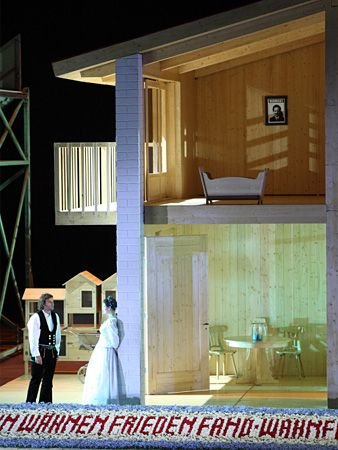|
|
|
|
|
|
|
|
| Financial Times, 9 July 2009 |
| Shirley Apthorp |
|
|
Lohengrin, Bavarian State Opera, National Theatre
|
|
 The
elegant walls of Munich’s national theatre are papered with grainy
black-and-white posters: A smiling boy, and the word “Missing”. The
elegant walls of Munich’s national theatre are papered with grainy
black-and-white posters: A smiling boy, and the word “Missing”.
Lohengrin, an anti-hero in tracksuit trousers and T-shirt, returns the young
Gottfried just in time to see the people of Brabant commit collective
suicide. Some legacy.
Richard Jones tells Lohengrin as a tale of apocalyptic failure. His vision
displeases the Munich audience, which boos vocally between acts and for the
final curtain. Jones cannot be surprised; he has targeted his public
pointedly, with costumes painting a picture of a rightwing postwar Bavaria
hungry for a new Führer. This is an Orwellian world, where the Herald is
broadcast on a flickering screen that all must watch and the collective
adheres numbly to prescribed social expectations. Men sport an embroidered
“B” on uniforms or blazers – Brabant, Bavaria, Big Brother? At first, Elsa
is alone in her dream of rebuilding society, marching past the militaristic
ranks with bricks and mortar. Later, Lohengrin draws the masses to lay down
their arms and build with them.
A perfect pine interior, complete with marital bed and cradle, awaits the
newlyweds – a miniature utopia, destined to founder. Elsa asks her forbidden
question, Telramund is felled with a blast of Harry Potter magic, Lohengrin
douses bed and crib with petrol and lights a match.
Jones gives us real people facing insoluble dilemmas. Elsa dreams of a
middle-class security that she can never have; Lohengrin wants unconditional
faith or ultimate destruction; Brabant is incapable of independence. A
strong concept is marred by dreary stretches of standing around, by
questions left open or cloaked in frenetic activity.
But the audience is unanimous in its adoration of the cast, and rightly
so. Jonas Kaufmann makes his debut as a very human Lohengrin, with the
intimate nuances of a Lied singer coupled with the tireless sheen of a
Heldentenor. Young, vital, refined and expressive, his performance is
gripping from start to finish. He is beautifully partnered by Anja
Harteros’s Elsa, which blends a burnished purity with passionate sincerity.
No role is less than superbly cast, from Christof Fischesser’s regal
Heinrich to Wolfgang Koch’s intelligent Telramund. Vocally, this is a
benchmark performance.
Nagano ensures that his singers are always heard, and brings a steely
transparency to the score. He has grave problems co-ordinating the chorus
and the orchestra, and never lets his phrases ease into organic sensuality –
but his vision has its own integrity. 4/5 stars |
|
|
|
|
|
|
|
|
|
|
|
|
|
|
|
|
|
|